Archive for the "V-Day" Category
Posted — Filed under
V-Day
Tagged — No Comments
 We are so proud to announce that V-Day Founder and Artistic Director Eve Ensler received the 2011 Isabelle Stevenson Tony Award last night, Sunday, June 12th, in NYC.
We are so proud to announce that V-Day Founder and Artistic Director Eve Ensler received the 2011 Isabelle Stevenson Tony Award last night, Sunday, June 12th, in NYC.
The Isabelle Stevenson Award recognizes an individual from the theater community who has made a substantial contribution of volunteered time and effort on behalf of humanitarian, social service or charitable organizations and is chosen by the Tony Awards Administration Committee.
We all at V-Day want to congratulate Eve on this momentous achievement, it is so well deserved and we are so proud of you!!!
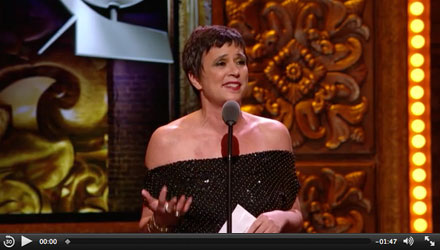
WATCH Eve’s Acceptance Speech >
“This all began when I said the word vagina in a little tiny theater way, way downtown in this very city. I said it again. I said it endlessly. I said it so many times over, women began to say it. I saw what happens when millions say vagina and when millions hear it. What I learned is that when you say what you’re not supposed to say, when you share your secrets, when you tell the truth, the world changes – people get free, they come into their power.”
“I accept this award on behalf all those who found their voices, their vaginas, their courage in the theater. And I call on all of us to remember why we were drawn to the theater, and to be braver, bolder, and more outrageous. I thank you from the bottom of my heart.”
– Eve Ensler
READ “Fugard, Ensler honored at Tonys” by Variety >
READ Playbill’s feature article on Eve, “A Life in the Theater” >
Posted — Filed under
V-Day
Tagged — No Comments
http://www.variety.com/article/VR1118038127?refcatid=15&printerfriendly=…
Activism at the heart of their art
By Bob Verini
Athol Fugard and Eve Ensler, recipients of honorary Tonys, share a passionate conviction that the roles of artist and activist are inseparable, with the real-life credentials to prove it.
Says Ensler, “Theater is the place where taboos get broken and truths get told.”
To Fugard, “Any significant work of art says something about the society it comes out of. It starts with being diagnostic, and sometimes prognostic…. A play of mine with three characters has a cast of thousands.”
Long before Nelson Mandela appeared on American radar, Fugard’s voice in “Boesman and Lena” and “Blood Knot” shook our conscience by exposing the personal realities of South African apartheid. In turn, “let’s face it, there’d be nothing to me if it hadn’t been for the support of the American theater community.” On Broadway he’s gone four-for-four in best play Tony nominations, with two performing wins for “my brother,” the late Zakes Mokae.
Fugard “found my voice” in Johannesburg (where, interestingly, Ensler’s new play will premiere this summer). Theater, he firmly believes, contributed to his nation’s transformation by “creating a climate in which people realized one could talk about issues, and change opinions and attitudes.”
Ensler says she began to learn the indivisibility of creativity and social engagement when she found herself discussing menopause with a friend.
“She just started talking about her vagina, saying that it was dried up, dead, finished…. I was first appalled, and then I realized I had no idea what women felt about their vaginas. So I just started asking people.”
The “shocking, funny, disturbing” findings became “The Vagina Monologues,” which eventually inspired V-Day, now in its 14th year. “I didn’t know,” she insists, “the scope, the grand impact of violence against women on the world.”
Feb. 14 marked 5,000 performances and the raising of $80 million for worldwide grassroots campaigns, “all because women and men have seized the play and the moment, wherever they are.”
When Fugard claims, “We, in a country that tried to divide people on the basis of color, got together and fought it in ‘Master Harold …,’ and did it again and again,” he’s living testament to Ensler’s credo: “Believe that you as an artist and an individual can make a difference. It sounds very simplistic, but in fact, that’s how the world changes.”
— Bob Verini
Posted — Filed under
V-Day
Tagged — No Comments
http://www.democracynow.org/2011/6/7/eve_ensler_on_gender_violence_in
On Wednesday, June 7th Eve Ensler and Christine Schuler Deschryver, V-Day’s Congo Director and Director of City of Joy, appeared on Democracy Now! speaking about V-Season 2011 and our Spotlight on Haiti, City of Joy opening in Bukavu, DRC and more.
Posted — Filed under
V-Day
Tagged — No Comments
Join V-Day Board member and CEO of the Paley Center Pat Mitchell for an evening with Eve at the Paley Center for Media in NYC on June 1st.
Eve will be the first interview in a new series Pat is producing/hosting for WNET and other PBS stations to be broadcast in the Fall. They will screen excerpts from Eve’s amazing work onstage, in film, books, documentaries…and how V-DAY has used media to raise awareness, raise funds, and make the world safer for women and girls.
Seating is limited, first come, first serve. Email membership@paleycenter.org
Best,
V-Day
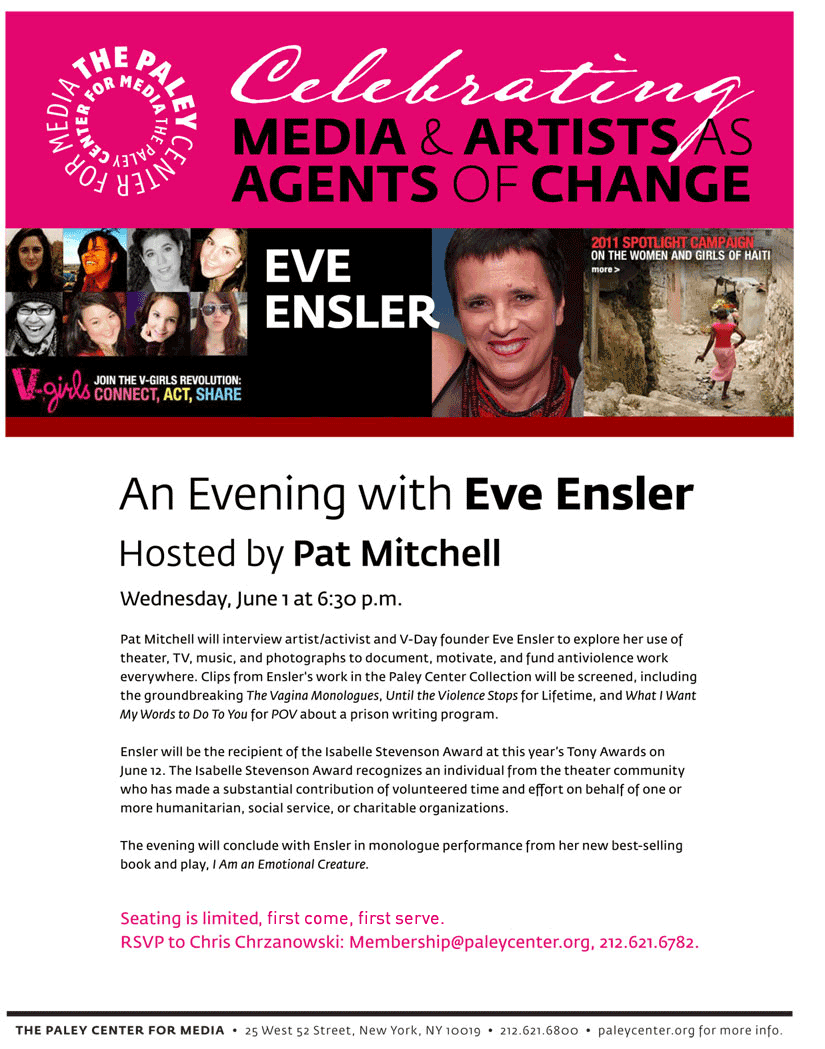
Posted — Filed under
V-Day
Tagged — No Comments
Español
http://www.huffingtonpost.com/eve-ensler/over_b_861159.html
OVER
By Eve Ensler
Here’s what I Am Over
400 thousand women getting raped a year in the Democratic Republic of Congo
48 women getting raped an hour
1,100 raped a day
I Am Over
This being new/news. The world responding to these statistics as if it’s the first time they ever heard anything about the atrocities in the Congo, when Western white people make reports the rapes exist. When the Congolese who live amidst the madness speak out, scream out, cry out, do we not believe them? Hear them? Do they not matter?
I Am Over
UN envoys and specialists and NGOs and governments debating statistics as if any of these numbers mattered. Who needs another report? Why should people waste precious time when we know the facts — have known the facts for over 13 years?
Consider this written in Danielle Shapiro’s recent piece in The Daily Beast:
“Yet the study provides the first numerical estimate using nationally representative data gathered through household-level interviews, said Amber Peterman, lead author and a gender development specialist at the International Food Policy Research Institute … Most other estimates on sexual violence in Congo have been specific to certain regions and/or relied on data collected from health centers, hospitals, police, or other authorities and service providers. That is, they relied on victims coming forward themselves (1).”
Gobbledygook.
I Am Over
The money it takes and the countless hours and the drain on the women to do these studies.
It turns out the women of Congo already know they were raped.
How many more ways do you need to know it, hear it, understand that there is femicide in the Congo and the women and girls are being systematically and consistently destroyed? How many more times are we going to ask Congolese women and little girls to sit and re-experience their stories of horror so that those who come from the West can make yet another new report that does absolutely nothing to prevent them from being raped or hold their rapists accountable? How many more time are we going to drag Panzi Hospital’s Dr. Denis Mukwege and City of Joy/V-Day Congo’s Christine Schuler Deschryver and AFEM’s Chouchou Namegabe on world rape talking tours, forcing them to reopen their wounded hearts and traumas? Is this sport?
How many more raped women and girl children will do the trick? A million every year, all the 2 million raped women raped again and again?
I Am Over
The stories. The horror. The nightmare.
I am over the pornographic repetition of gross sexual invasion and destruction and the mad distraction of the accumulation of statistics.
Danielle Shapiro goes on to quote Peterman, a lead author of the study in her piece, and to chronicle the inane conversation over statistics:
” ‘The study is significant not only because it reveals greater numbers, but because the data is internationally recognized [and] produced in partnership with the DRC government,’ Peterman said … Still, some are skeptical of the study’s reliability … Special Representative Wallström noted in an email that how terms like ‘sexual violence’ and ‘intimate partner violence’ are defined can be one reason for disparities among various studies. Others question whether the sample of women interviewed was representative. And some point out that, because the data come from 2006 and 2007, it may not reflect what’s happening on the ground in Congo now … Still, Tony Gambino, the former mission director in Congo for the United States Agency for International Development, said that he’s seen no evidence to suggest the situation is better for women now than it has been. U.N. figures on sexual violence for the last few years have also remained relatively stable (2). “
Yes, we like our rape statistics stable. We like to meet our quota of raped women. We try to keep the levels steady. I Am Over The U.N. making insane statements. Reuters reporter Johnny Hogg recently wrote:
“Attinger Colijn [head of the Sexual Violence Unit in the office of the Deputy Special Representative of the Secretary General on the Rule of Law] said that emphasizing the issue of sexual violence was a distraction from the wider problems of insecurity and violence that still beset the country, with donors channeling vast sums of money into projects focused on rape.’We don’t need figures like this to know sexual violence is a problem, there are many other types of violence and human rights issues that need to be tackled (3),’ she added.”
Statements like Attinger Colijn’s reflect the true position of the UN, which is that it has never understood rape or sexual violence, never believed the consequences, always been afraid to talk about it openly with the appropriate outrage and intention needed to do something real and significant to make it stop.
I Am Over
President Obama, who won’t, who can’t even enact a law he created before he became a super warrior president. The 2006 Obama Law (Public Law 109-456) calls for a Special Envoy to the Great Lakes region and allows the U.S. to hold countries playing a part in the war on Congo’s soil accountable by withholding aid. What is he waiting for?
I Am Over
President Obama and his team leaping head first into the protection of Libya with military might and intervention (which by the way I am not calling for anywhere in the world) when the situation, as terrible as it is, is no where near the humanitarian disaster of the Congo. With Congo, he seems completely immobilized to move with any real diplomatic will because, as the devoted Congolese activist Kambale Musavuli says, “[t]he suspicion many analysts share is that the U.S. is quick to act against its enemies while providing cover for its allies, even if its allies are clearly culpable for committing mass atrocities, crimes against humanity and possible genocide…(4)”
I Am Over
A world that could allow, has allowed, continues to allow 400 thousand women, 23,00 women, or one woman to be raped anywhere, anytime of any day in the Congo.
The women of Congo are over it too. When I was there last month they told me they were going to begin a story strike and stop telling about their rapes. They want peace. They are not entertainment. Their suffering is not for consumption. Dr. Mukwege didn’t plan or desire to spend his life sewing up the raped and destroyed vaginas of the beloved women of his country. When will the time come when we give Dr. Mukwege awards for bringing life into this world, for helping the women of his country thrive and give birth and build lives, instead of awarding him for the sorrowful work he is required to do?
I Am Over It.
No more studies of raped women
No more statistics
No more breaking news that is 14 years old
No more pretending you didn’t know
Pass the Obama law
Get Rwanda and Uganda and Burundi and Angola out of Congo
With diplomatic pressure
Train women soldiers and police officers
Support local Congolese women’s groups on the ground –
Not with directions and agendas but with money
Make noise
Let It Be Over.
References:
- Congo Rape Crisis: Study Reveals Shocking New Numbers by Danielle Shapiro, Daily Beast
- Congo Rape Crisis: Study Reveals Shocking New Numbers by Danielle Shapiro, Daily Beast
- 400,000-plus women raped in Congo yearly: study by Jonny Hogg, Reuters
- Africa In The Age of Obama by Kumbale Musavuli, Black Star News
Follow Eve Ensler on Twitter: www.twitter.com/vdayorg
Posted — Filed under
V-Day
Tagged — No Comments
http://www.bostonreview.net/BR36.3/junot_diaz_apocalypse_haiti_earthquak…
By Junot Díaz
Apocalypse
What Disasters Reveal
ONE
On January 12, 2010 an earthquake struck Haiti. The epicenter of the quake, which registered a moment magnitude of 7.0, was only fifteen miles from the capital, Port-au-Prince. By the time the initial shocks subsided, Port-au-Prince and surrounding urbanizations were in ruins. Schools, hospitals, clinics, prisons collapsed. The electrical and communication grids imploded. The Presidential Palace, the Cathedral, and the National Assembly building—historic symbols of the Haitian patrimony—were severely damaged or destroyed. The headquarters of the UN aid mission was reduced to rubble, killing peacekeepers, aid workers, and the mission chief, Hédi Annabi.
The figures vary, but an estimated 220,000 people were killed in the aftermath of the quake, with hundreds of thousands injured and at least a million—one-tenth of Haiti’s population—rendered homeless. According to the Red Cross, three million Haitians were affected. It was the single greatest catastrophe in Haiti’s modern history. It was for all intents and purposes an apocalypse.
TWO
Apocalypse comes to us from the Greek apocalypsis, meaning to uncover and unveil. Now, as James Berger reminds us in After the End, apocalypse has three meanings. First, it is the actual imagined end of the world, whether in Revelations or in Hollywood blockbusters. Second, it comprises the catastrophes, personal or historical, that are said to resemble that imagined final ending—the Chernobyl meltdown or the Holocaust or the March 11 earthquake and tsunami in Japan that killed thousands and critically damaged a nuclear power plant in Fukushima. Finally, it is a disruptive event that provokes revelation. The apocalyptic event, Berger explains, in order to be truly apocalyptic, must in its disruptive moment clarify and illuminate “the true nature of what has been brought to end.” It must be revelatory.
“The apocalypse, then,” per Berger, “is the End, or resembles the end, or explains the end.” Apocalypses of the first, second, and third kinds. The Haiti earthquake was certainly an apocalypse of the second kind, and to those who perished it may even have been an apocalypse of the first kind, but what interests me here is how the Haiti earthquake was also an apocalypse of the third kind, a revelation. This in brief is my intent: to peer into the ruins of Haiti in an attempt to describe what for me the earthquake revealed—about Haiti, our world, and even our future.
After all, if these types of apocalyptic catastrophes have any value it is that in the process of causing things to fall apart they also give us a chance to see the aspects of our world that we as a society seek to run from, that we hide behind veils of denials.
Apocalyptic catastrophes don’t just raze cities and drown coastlines; these events, in David Brooks’s words, “wash away the surface of society, the settled way things have been done. They expose the underlying power structures, the injustices, the patterns of corruption and the unacknowledged inequalities.” And, equally important, they allow us insight into the conditions that led to the catastrophe, whether we are talking about Haiti or Japan. (I do believe the tsunami-earthquake that ravaged Sendai this past March will eventually reveal much about our irresponsible reliance on nuclear power and the sinister collusion between local and international actors that led to the Fukushima Daiichi catastrophe.)
Becoming a ruin–reader might not be so bad a thing. It could in fact save your life.
If, as Roethke writes, “in a dark time, the eye begins to see,” apocalypse is a darkness that gives us light.
But this is not an easy thing to do, this peering into darkness, this ruin-reading. It requires nuance, practice, and no small amount of heart. I cannot, however, endorse it enough. Given the state of our world—in which the very forces that place us in harm’s way often take advantage of the confusion brought by apocalyptic events to extend their power and in the process increase our vulnerability—becoming a ruin-reader might not be so bad a thing. It could in fact save your life.
THREE
So the earthquake that devastated Haiti: what did it reveal?
Well I think it’s safe to say that first and foremost it revealed Haiti.
This might strike some of you as jejune but considering the colossal denial energies (the veil) that keep most third-world countries (and their problems) out of global sightlines, this is no mean feat. For most people Haiti has never been more than a blip on a map, a faint disturbance in the force so far removed that what happened there might as well have been happening on another planet. The earthquake for a while changed that, tore the veil from before planet’s eyes and put before us what we all saw firsthand or on the TV: a Haiti desperate beyond imagining.
If Katrina revealed America’s third world, then the earthquake revealed the third world’s third world. Haiti is by nearly every metric one of the poorest nations on the planet—a mind-blowing 80 percent of the population live in poverty, and 54 percent live in what is called “abject poverty.” Two-thirds of the workforce have no regular employment, and, for those who do have jobs, wages hover around two dollars a day. We’re talking about a country in which half the population lack access to clean water and 60 percent lack even the most basic health-care services, such as immunizations; where malnutrition is among the leading causes of death in children, and, according to UNICEF, 24 percent of five-year-olds suffer stunted growth. As the Haiti Children Project puts it:
Lack of food, hygienic living conditions, clean water and basic healthcare combine with epidemic diarrhea, respiratory infections, malaria, tuberculosis and HIV/AIDS to give Haiti among the highest infant, under-five and maternal mortality rates in the western hemisphere.
In Haiti life expectancy hovers at around 60 years as compared to, say, 80 years, in Canada.
Hunger, overpopulation, over-cultivation, and dependence on wood for fuel have strained Haiti’s natural resources to the breaking point. Deforestation has rendered vast stretches of the Haitian landscape almost lunar in their desolation. Haiti is eating itself. Fly over my island—Hispaniola, home to Haiti and my native Dominican Republic—as I do two or three times a year, and what you will see will leave you speechless. Where forests covered 60 percent of Haiti in 1923, only two percent is now covered. This relentless deforestation has led to tremendous hardships; it is both caused by and causes poverty. Without forests, 6,000 hectares of arable land erode every year, and Haiti has grown more vulnerable to hurricane-induced mudslides that wipe out farms, roads, bridges, even entire communities. In 2008 four storms caused nearly a billion dollars in damage—15 percent of the gross domestic product—and killed close to a thousand people. The mudslides were so extensive and the cleanup so underfunded that much of that damage is still visible today.
In addition to resource pressures, Haiti struggles with poor infrastructure. Political and social institutions are almost nonexistent, and a deadly confluence of political instability, pervasive corruption, massive poverty, and predation from elites on down to armed drug gangs has unraveled civic society, leaving the majority of Haitians isolated and at risk. Even before the earthquake, Haiti was reeling—it would not have taken the slightest shove to send it into catastrophe.
All this the earthquake revealed.
Continue Reading >
Posted — Filed under
V-Day
Tagged — No Comments
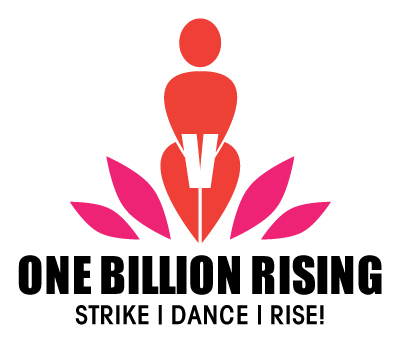 This weekend, in celebration of Mother’s Day V-Day is calling on you to sign up for the rising, AND while you’re at it to gather 15 women including your mothers, grandmothers, aunts, friends and sign them up too! Together you will pledge to STRIKE, DANCE and RISE on 2.14.13 for ONE BILLION RISING!
This weekend, in celebration of Mother’s Day V-Day is calling on you to sign up for the rising, AND while you’re at it to gather 15 women including your mothers, grandmothers, aunts, friends and sign them up too! Together you will pledge to STRIKE, DANCE and RISE on 2.14.13 for ONE BILLION RISING!
The path to ONE BILLION RISING starts with you, and what better day than Mother’s Day to birth the ONE BILLION RISING movement in your community.
SIGN UP and SEND a message to up to 15 people inviting them to join the campaign >
Posted — Filed under
V-Day
Tagged — No Comments
Celebrate Mother’s Day by supporting the global movement to end violence against women and girls. NEW this year, V-Day is offering two Mother’s Day V-Card designs to chose from. Make a donation to V-Day on behalf of your mother, friends, and loved ones, and V-Day will send the specially designed 2012 Mother’s Day V-Card of your choice letting them know of their unique gift in their honor.
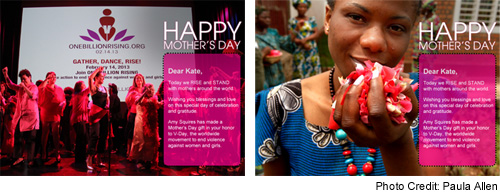
CLICK HERE to give this V-Gift >
To send a V-Card on the donate page, check the box next to “Donate on behalf of a loved one?” labeled “Yes, I would like to send a V-Day e-card,” chose the design you would like to send, and fill in the rest of the information to finish designing your gift.
CLICK HERE to give this V-Gift >
Posted — Filed under
V-Day
Tagged — No Comments
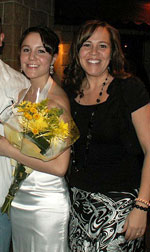 In tribute to mothers, grandmothers, and caregivers, the new V-Girls blog will feature a very special “Dialogue with Daughters” series. This blog series will include articles and video blogs by our V-Girls Action Team members and guest bloggers beginning today, Friday, May 6 in honor of Mother’s Day and will continue through the month of May. Our bloggers will explore and celebrate the relationships between girls and the women who raise and care for them. Catch a sneak peak below, and follow the V-Girls blog all month at
In tribute to mothers, grandmothers, and caregivers, the new V-Girls blog will feature a very special “Dialogue with Daughters” series. This blog series will include articles and video blogs by our V-Girls Action Team members and guest bloggers beginning today, Friday, May 6 in honor of Mother’s Day and will continue through the month of May. Our bloggers will explore and celebrate the relationships between girls and the women who raise and care for them. Catch a sneak peak below, and follow the V-Girls blog all month at
www.v-girls.org.
“I love being a girl, because I am the daughter of a teen mother who never gave up. I love being a young woman because my mom taught me to stand tall, because my grandma taught her to do the same. I love being a daughter because it keeps me grounded and humble.”
– Audri Roybal, V-Girls Action Team Member
“Daughtering is about growing, often with shaky steps; it’s about empowered action and taking the reins in my own life. I think that Daughtering is about having new insights into old patterns of relating, starting with my relationship with my mom and extending to my relationships with my dad, my grandma, my friends and my world. Daughtering is claiming my vision.”
– Eliza Reynolds, Guest Blogger
“When I say, ‘I am turning into my mother’, I mean I am turning into my hero: elegant, intelligent, generous, kind, strong, loving, funny and beautiful. I can only hope to be half the woman you are. The best compliment is when someone tells me I am just like you.”
– Molly Houlahan, V-Girls Action Team Member
 We are so proud to announce that V-Day Founder and Artistic Director Eve Ensler received the 2011 Isabelle Stevenson Tony Award last night, Sunday, June 12th, in NYC.
We are so proud to announce that V-Day Founder and Artistic Director Eve Ensler received the 2011 Isabelle Stevenson Tony Award last night, Sunday, June 12th, in NYC.



 In tribute to mothers, grandmothers, and caregivers, the new V-Girls blog will feature a very special “Dialogue with Daughters” series. This blog series will include articles and video blogs by our V-Girls Action Team members and guest bloggers beginning today, Friday, May 6 in honor of Mother’s Day and will continue through the month of May. Our bloggers will explore and celebrate the relationships between girls and the women who raise and care for them. Catch a sneak peak below, and follow the V-Girls blog all month at
In tribute to mothers, grandmothers, and caregivers, the new V-Girls blog will feature a very special “Dialogue with Daughters” series. This blog series will include articles and video blogs by our V-Girls Action Team members and guest bloggers beginning today, Friday, May 6 in honor of Mother’s Day and will continue through the month of May. Our bloggers will explore and celebrate the relationships between girls and the women who raise and care for them. Catch a sneak peak below, and follow the V-Girls blog all month at